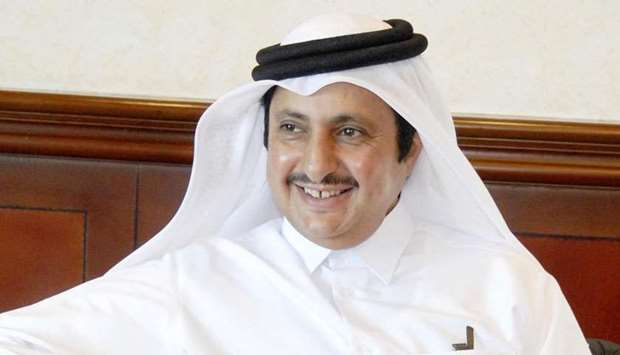Qatar Chamber will continue to forge ties with local and international partners to continue its bid to strengthen the country’s private sector, which is leading the drive towards economic diversification, according to its chairman, Sheikh Khalifa bin Jassim al-Thani.
Speaking to Gulf Times on the sidelines of the International Product Exhibition and Conference (IPEC 2018), which concluded yesterday, Sheikh Khalifa underscored the importance of expanding private sector ties with local and international partners.
He also lauded Qatar’s international partners, especially countries that had supported the country immediately after the economic blockade was imposed by four Arab nations on June 5, 2017.
“Qatar’s private sector had played an important role in mobilising efforts to bridge the gap and cushion the impact of this unjust siege. We were able to meet the needs of the market, preventing any shortages in essential goods, particularly food products,” Sheikh Khalifa emphasised.
Underlining its role as a private sector leader, Sheikh Khalifa stressed that Qatar Chamber signed 15 memorandums of agreement (MoUs) with other international chambers.
Aside from hosting a number of foreign trade delegations, Sheikh Khalifa said Qatar Chamber also organised international business trips to connect Qatari companies with foreign counterparts and expand Qatar’s trade network.
Private sector contribution to economic development and diversification had been the central theme at the three-day IPEC 2018, which gathered 69 local companies and 294 international businesses to the Doha Exhibition and Convention Centre.
In a speech delivered after inaugurating the event, HE the Prime Minister and Interior Minister Sheikh Abdullah bin Nasser bin Khalifa al-Thani stressed on the “vital role” played by the private sector in executing national strategies and plans to achieve Qatar National Vision 2030.
“We count on its capabilities and potential as it proved its aptitude for developing many economic sectors of the economy and limiting the repercussions of the unjust blockade on Qatar.
“We look forward to a wider role for the private sector in managing and carrying out projects, and we will continue to catalyse it to be the main driver of economic growth and development in the country in the coming period,” he said.
Similarly at the event’s panel discussion, HE the Minister of Finance Ali Sherif al-Emadi said private sector growth stood at more than 4%, “which exceeded official expectations.”
In another panel discussion, QNB Group CEO Ali Ahmed al-Kuwari noted that private sector contribution to GDP stood at 68%, an achievement that runs parallel to the objectives of Qatar National Vision 2030.


